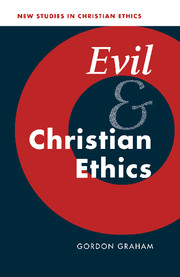2 - The real Jesus
Published online by Cambridge University Press: 03 December 2009
Summary
The previous chapter introduced the principal claim of this book, a somewhat ambitious one, that only a theological context can adequately account for the seriousness of morality and the reality of evil. But, to take only the first claim, if theology does explain the seriousness of morality, how does it do so, and in particular, how does Christian theology do this?
The model of Christian ethics as one distinctive code amongst the many competing and conflicting ‘moral systems’ within a pluralist world (a model about which substantial doubts were raised in the first chapter) has an appropriately straightforward answer to this question. Christian ethics is the code of conduct that approves the actions and attitudes Christ commended, and rejects those which He condemned. There is a parallel here with Mohammed and the Koran, but if we combine with this the Doctrine of the Incarnation the implication is that the words of Jesus are the words of God, from which we can conclude that the basis of Christian ethics is divine commandment, the law of God. One major objection to this way of thinking, the objection canvassed in the previous chapter, is that there simply is no list of moral principles or injunctions which can accurately be described as distinctively and exclusively Christian. If this is true, then we are lacking at least one crucial element in the model – a determinate content to ‘Christian ethics’. But radical though this objection may be, it is not the only difficulty the commonplace model of Christian ethics encounters.
- Type
- Chapter
- Information
- Evil and Christian Ethics , pp. 29 - 73Publisher: Cambridge University PressPrint publication year: 2000



